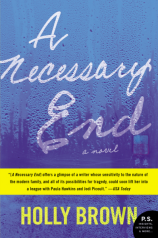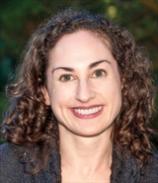Reading Group Guide
Discussion Questions
A Necessary End

1. Adrienne is 39, and she and her husband, Gabe, are without a child. Now that she’s reaching the end(ish) of her childbearing years, she’s obsessed with finding a way to adopt. Did you, or do you, feel pressure to have children?
2. If you couldn’t have children, would you consider adopting one or some? Why or why not? If you already have borne a child or children, would you consider adopting?
3. Is being an adoptive parent different from giving birth to a child? Should Adrienne and Leah have different rights as mothers?
4. Throughout A NECESSARY END, Gabe feels ambivalent about becoming a father, while, for Adrienne, becoming a mother is essential to her future happiness. Do you think men feel differently about parenting than women do? If so, why do you think that is --- biology, social conditioning, or a mix of both?
5. Unlike Adrienne, some women choose not to have children on purpose. Can you identify with this choice? Why or why not? Is a woman any less of a person if she decides not to have children? Does the standard hold true for men as well?
6. At the beginning of the novel, Adrienne veers toward the extreme when thinking about motherhood. She rubs pregnant women’s bellies, hoards baby clothes in kitchen cabinets, and draws hair down her torso with an eyebrow pencil. What do you make of her behavior? Is it normal, or do you side with Gabe’s hunch that she’s become a little too obsessed?
7. Leah proposes a fairly unorthodox plan for the birth of her baby. What were your initial thoughts when she revealed her scheme to live with Gabe and Adrienne while they raised Michael? Did your opinion change over the course of the book? If you were in Adrienne or Gabe’s shoes, would you have agreed to an open adoption? Why or why not?
8. In Chapter 12, Gabe thinks to himself, “Everyone uses everyone.” In a sense, this is true of all the characters in the book --- even the minor ones. Would you agree with his assessment? Why or why not?
9. Gabe’s behavior is questionable throughout A NECESSARY END. He reneges on his fatherly duties. He slacks off at his job. He even comes on to Leah. A lot of men are frightened by the idea of becoming a father. Given these real fears, is his behavior justified? Did you feel any sympathy for Gabe over the course of the book?
10. Along the same lines, it has been said that the bond between mother and child is unbreakable. Given this fact, does it excuse Adrienne’s willingness to do whatever it takes to become a mother? Given Leah’s own upbringing, do her attempts at creating a family excuse her actions, even if it means nearly destroying Gabe and Adrienne’s marriage?
11. None of the characters in A NECESSARY END are particularly likable. Which one do you feel the most sympathy or empathy toward? Who do you think deserves the most blame? Why?
12. The title of the novel is A NECESSARY END. Do you think it’s fitting? Why or why not?
13. Holly Brown tells the story from two perspectives: Gabe’s and Adrienne’s. How would the reading experience be different if Brown also devoted a few chapters to Leah’s point of view? Or picked one of the characters and wrote the entire book from his or her perspective, in first person?
14. Toward the end of the novel, Brown throws in a few plot twists that take the story down a shocking path. Did you see any of them coming? Do you think the ending works given the trajectory of the story? Why or why not? If not, what might be a more suitable option?
15. Given Adrienne’s track record with Patty, does it seem credible that she’d willingly enter into another open adoption situation? Does gullibility or a willingness to see the best in people have anything to do with her decision, or should she have been more suspicious from the get-go?
16. Each of the characters keeps secrets from loved ones. Are any of them right to do so, or are the secrets part of the problem?
17. If you could pick the best parent for baby Michael, who would it be: Leah, Adrienne, Gabe, Trevor, or someone else entirely?
18. In addition to being a novelist, Holly Brown is a marriage and family therapist. Does this surprise you? How do you think her other career influences her writing?
A Necessary End
- Publication Date: March 8, 2016
- Genres: Fiction, Psychological Suspense, Psychological Thriller, Suspense, Thriller
- Paperback: 416 pages
- Publisher: William Morrow Paperbacks
- ISBN-10: 0062356380
- ISBN-13: 9780062356383








